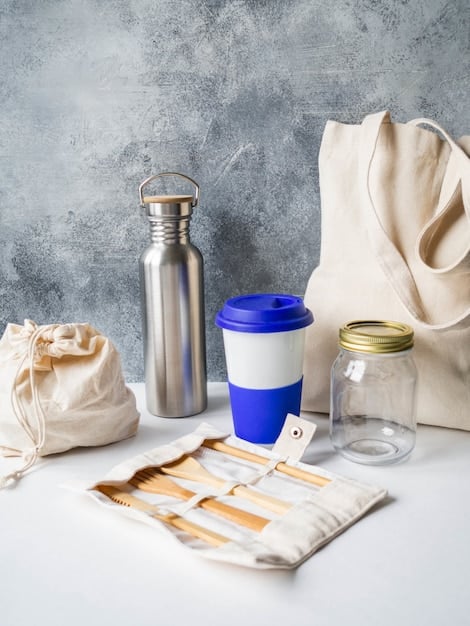Sustainable Living: Reduce Plastic Waste & Save $300 Annually

Sustainable Living by reducing plastic waste involves switching to reusable alternatives, potentially saving an average of $300 annually through reduced spending on disposable items and promoting a healthier environment.
Embark on a journey towards sustainable living by making conscious choices to reduce plastic waste. Discover how simple swaps to reusable alternatives can not only benefit the environment but also save you approximately $300 annually.
Why Reduce Plastic Waste? The Environmental and Financial Impact
Plastic waste is a global crisis, affecting ecosystems and our wallets. Understanding the impact helps us make informed decisions towards sustainable living.
Reducing plastic waste means less pollution in our oceans and landfills. It also translates to potential savings for households willing to embrace reusable alternatives.
Environmental Consequences of Plastic
Plastic pollution harms wildlife and ecosystems. Microplastics contaminate our food chain, posing health risks.
The Financial Burden of Single-Use Plastics
Constantly buying disposable items adds up. Reusable alternatives offer long-term cost savings and environmental benefit.
- Reduced Landfill Waste: Less plastic in landfills means less environmental harm.
- Ocean Conservation: Minimizing plastic prevents harm to marine life.
- Healthier Living: Reducing microplastic exposure promotes better health.
- Cost Savings: Reusable options save money over time.
By understanding the environmental and financial burdens, we’re better equipped to embracesustainable living and reduce plastic waste.

Top Reusable Alternatives to Ditch Single-Use Plastics
Switching to reusable alternatives is a key step in sustainable living and reducing plastic waste. Let’s explore some impactful swaps.
From the kitchen to your daily commute, reusable items can replace single-use plastics, saving you money and contributing to a healthier planet.
Reusable Shopping Bags
Keep reusable bags in your car or by the door. Say no to plastic bags at the grocery store and other retailers.
Reusable Water Bottles and Coffee Cups
Invest in a durable water bottle and coffee cup. Refilling them reduces plastic bottle waste and can even earn you discounts at some coffee shops.
Choosing the right reusable alternatives can reduce plastic waste and support sustainable living.
Tracking Your Savings: How Reusable Alternatives Pay Off
It’s easy to show how switching to reusable alternatives can reduce plastic waste and result in significant savings, promoting a more sustainable living.
Tracking your savings can motivate you to continue making eco-friendly choices. Here’s how to monitor your progress effectively.
Calculate Your Current Spending
Estimate how much you spend on disposable items like plastic water bottles, coffee cups, and shopping bags each month.
Monitor Savings After Switching
Track the cost of your reusable alternatives. Compare the initial investment with the money you save by not buying disposable products.
- Create a Spreadsheet: Log your purchases and savings to see the impact.
- Use Budgeting Apps: Many apps can help track your spending habits.
- Take Advantage of Discounts: Some stores offer discounts for using reusable items.
- Set Savings Goals: Aim to save a specific amount each month.
Tracking your savings highlights the financial benefits of sustainable living and encourages further efforts to reduce plastic waste.

DIY Reusable Products: Creative Ways to Reduce Waste
Creating your own reusable products can be a fulfilling way to reduce plastic waste and is a great way to integrate into sustainable living.
DIY projects not only minimize waste but also allow you to customize items to fit your needs and preferences.
Homemade Cloth Produce Bags
Sew simple cloth bags for your fruits and vegetables. This eliminates the need for plastic produce bags at the grocery store.
Beeswax Wraps for Food Storage
Make beeswax wraps using cotton fabric, beeswax, and a few other ingredients. These wraps are a natural alternative to plastic wrap.
DIY projects empower you to reduce plastic waste and embrace a creative approach to sustainable living.
Overcoming Challenges: Making Sustainable Choices Easier
Adopting sustainable living practices and working to reduce plastic waste can present challenges. Let’s address common barriers and find solutions.
It’s important to develop strategies to overcome obstacles and maintain your commitment to reducing plastic use.
Convenience and Accessibility
Sometimes, it’s easier to grab a disposable item. Plan ahead and keep reusable alternatives handy for on-the-go situations.
Breaking Old Habits
Changing ingrained behaviors takes time. Start with small, manageable steps and reward yourself for progress.
- Prepare in Advance: Pack reusable items before leaving home.
- Stay Informed: Learn about new sustainable products and practices.
- Seek Community Support: Join groups or forums for inspiration and advice.
- Celebrate Successes: Acknowledge and reward your achievements to stay motivated.
Addressing challenges and maintaining momentum are crucial for successfulsustainable living and reduce plastic waste.
Long-Term Benefits: Sustainable Living for Future Generations
The shift towards sustainable living and efforts to reduce plastic waste create lasting benefits for our planet and future generations.
By choosing sustainable options, you’re contributing to a healthier world and setting a positive example for others.
Preserving Natural Resources
Reducing plastic waste conserves natural resources used in plastic production, such as oil and gas.
Creating a Circular Economy
Embracing reusable alternatives supports a circular economy, where products are designed for reuse and recycling.
Prioritizing long-term benefits ensures that sustainable living practices to reduce plastic waste have a far-reaching impact.
| Key Point | Brief Description |
|---|---|
| 💰 Save $300 Annually | Switching to reusable items can significantly cut your yearly expenses. |
| 🌱 Reduce Plastic Waste | Opting for reusable alternatives helps minimize environmental impact and pollution. |
| ♻️ Embrace Reusables | Use shopping bags, water bottles, and coffee cups to replace single-use plastics. |
| 🛠️ DIY Solutions | Create your own reusable products like cloth bags and beeswax wraps to cut waste. |
Frequently Asked Questions About Reducing Plastic Waste
▼
Many people find they can save around $300 per year by switching to reusable water bottles, coffee cups, shopping bags, and food containers, which reduces the constant need to repurchase single-use plastic items.
▼
Start by replacing plastic shopping bags with reusable ones, using a refillable water bottle instead of buying bottled water, and switching to reusable coffee filters instead of disposable ones.
▼
Yes, reducing plastic use can lower your exposure to potentially harmful chemicals that can leach from plastic containers into food and water, leading to improved health outcomes over time.
▼
Lead by example by using reusable items yourself, educate them about the environmental benefits, and make it a fun challenge with rewards for reaching certain milestones in reducing plastic waste.
▼
Many online retailers, local grocery stores, and zero-waste shops offer affordable reusable alternatives such as stainless steel water bottles, silicone food storage bags, and bamboo utensils at competitive prices.
Conclusion
Adopting sustainable living practices and committing to reduce plastic waste is a rewarding journey that benefits both your wallet and the environment. Making small changes to use reusable alternatives can lead to significant savings and a more sustainable future for all.





